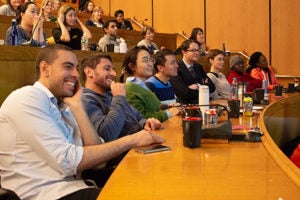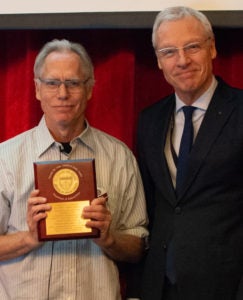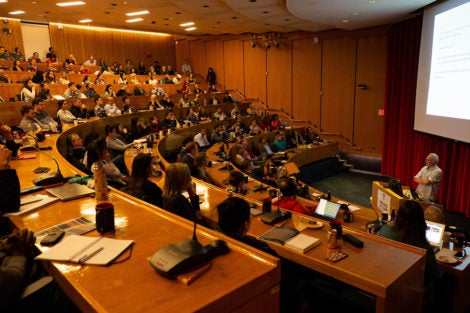December 11, 2019 – Epidemiologist James Robins says that it took him a long time to get a paper published.
At the 170th Cutter Lecture in Preventive Medicine on December 6, 2019, Robins, Mitchell L. and Robin LaFoley Dong Professor of Epidemiology at Harvard T.H. Chan School of Public Health, told a standing-room only crowd in Kresge’s Snyder Auditorium about getting pushback from fellow academics after developing a new methodology for estimating the causal effects of drug treatments, surgeries, or exposures to substances such as cigarette smoke or environmental toxins.
In a talk titled “The ‘Causal Revolution’ in Epidemiology and Medicine: History, Controversies and Future,” Robins said that he realized while studying epidemiology and biostatistics in the 1980s that existing analytical methods didn’t address the fact that exposures can change over time. So he developed new methods that took those changes into account, to enable researchers to better understand complex information from observational studies and randomized trials.
Although some of the initial reaction to Robins’ ideas was negative—he was told, for example, that his methods were too computationally complex—they are now used in a wide range of fields, including epidemiology, biostatistics, sociology, economics, artificial intelligence, and political science.
Introducing Robins, Miguel Hernán, Kolokotrones Professor of Biostatistics and Epidemiology, said, “Have you ever met a true genius? For anyone who knows Jamie Robins, the answer is obviously yes.” Describing one conversation with Robins, Hernan said it was like someone “turned the lights on inside my head.”
 Prior to Robins’ talk, the Department of Epidemiology hosted the 4th Cutter Symposium: Epidemiology, Etiology, and Big Data. Speakers included Alkes Price, professor of statistical genetics, who spoke on “Polygenic Functional Architectures of Common Disease”; Andrew Beam, assistant professor of epidemiology, who spoke on “Machine Learning in Healthcare: The Promise and the Peril”; Tianxi Cai, John Rock Professor of Population and Translational Data Sciences, whose talk was titled “Towards a Self-Learning Healthcare System”; and Caroline Buckee, associate professor of epidemiology, who spoke about “Controlling Epidemics: a Small- and Medium-sized Data Problem.”
Prior to Robins’ talk, the Department of Epidemiology hosted the 4th Cutter Symposium: Epidemiology, Etiology, and Big Data. Speakers included Alkes Price, professor of statistical genetics, who spoke on “Polygenic Functional Architectures of Common Disease”; Andrew Beam, assistant professor of epidemiology, who spoke on “Machine Learning in Healthcare: The Promise and the Peril”; Tianxi Cai, John Rock Professor of Population and Translational Data Sciences, whose talk was titled “Towards a Self-Learning Healthcare System”; and Caroline Buckee, associate professor of epidemiology, who spoke about “Controlling Epidemics: a Small- and Medium-sized Data Problem.”

Opening remarks at both events were given by Albert Hofman, chair of the Department of Epidemiology, and Harvard Chan School Dean Michelle Williams.
The Cutter Lecture on Preventive Medicine has been held at Harvard Chan School since 1912, supported by a bequest from John Clarence Cutter, a graduate of Harvard Medical School.
photos: Sarah Sholes, Ernald Furxhi
